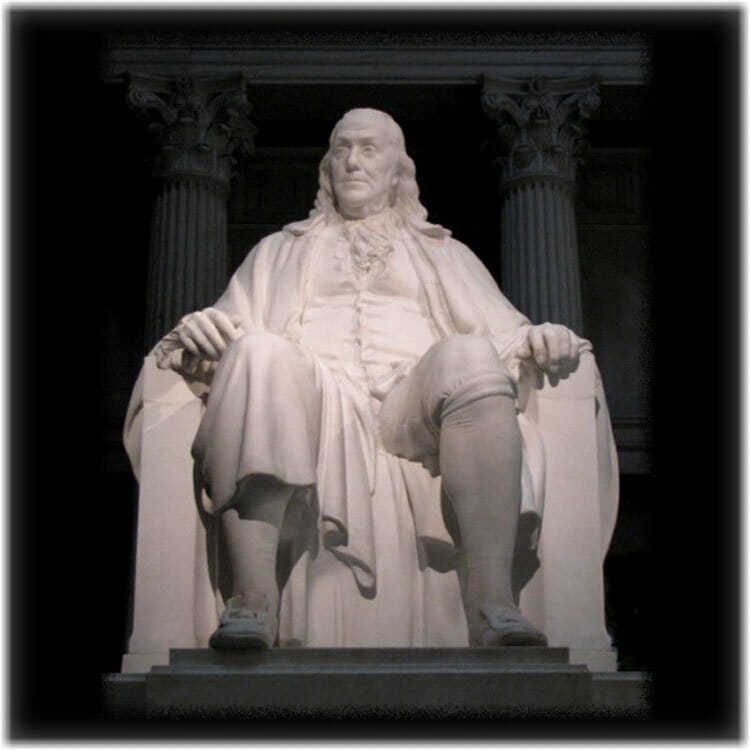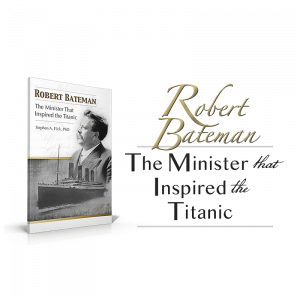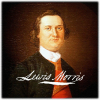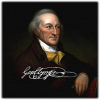Benjamin Franklin Was Not a Secularist

Leaving the deism of his youth and the immorality it produced, Benjamin Franklin came to realize that the Calvinism of his youth was closer to reality than he had previously imagined.[1] Though never fully returning to this theological tradition in which he was raised, he realized that human government must reflect God's government of the world, and for this reason, secularists, atheists, agnostics, and the irreligious falsely attempt to lay claim to Franklin as one of their patron saints. This brief primary writing of Benjamin Franklin—though challenging—completely destroys present secular interpretations of "separation of church and state." In fact, Franklin's arguments in this writing provides insight into his rationale at the Constitutional Convention when he asked that deliberation concerning a constitution begin with prayer:
In the beginning of the contest with Great Britain, when we were sensible of danger, we had daily prayer in this room for the divine protection. Our prayers, sir, were heard, and they were graciously answered. All of us who were engaged in the struggle must have observed frequent instances of a superintending Providence in our favor. To that kind Providence we owe this happy opportunity of consulting in peace on the means of establishing our future national felicity. And, have we now forgotten that powerful Friend [the eternal God] ? Or do we imagine that we no longer need his assistance? I have lived, sir, a long time, and the longer I live the more convincing proofs I see of this truth: that God governs in the affairs of men. And if a sparrow cannot fall to the ground without his notice, is it possible that an empire can rise without his aid? We have been assured, sir, in the sacred writings that, except the Lord build the house, they labor in vain that build it. I firmly believe this, and I also believe that without his concurring aid we shall succeed, in this political building, no better than the builders of Babel.[2]
As reflected in this quotation and the writing below, Benjamin Franklin believed that human government was obligated to acknowledge the existence of God and dependence upon His goodness and infinite power in the affairs of the nation.
Article Contents
A Lecture On The Providence Of God In
The Government Of The World
I propose at this time to discourse on the providence of God in the government of the world. It might be judged an affront should I go about to prove this first principle, the existence of a Deity, and that he is the creator of the universe, for that all mankind, in all ages, have agreed in. I shall, therefore, proceed to observe that he must be a being of infinite wisdom, as appears in his admirable order and disposition of things—whether we consider the heavenly bodies, the stars and planets, and their wonderful regular motions; or this earth, compounded of such an excellent mixture of all elements; or the admirable structure of animate bodies, of such infinite variety, and yet every one adapted to its nature and way of life it is to be placed in, whether on earth, in the air, or in the water, and so exactly that the highest and most exquisite human reason cannot find a fault and say that this would have better so, or in such a manner; which whoever considers attentively and thoroughly will be astonished and swallowed up in admiration.
That the Deity is a being of great goodness, appears in his giving life to so many creatures, each of which acknowledges it a benefit by their unwillingness to leave it; in his providing plentiful sustenance for them and making those things most useful most common and easy to be had; such as water, necessary for almost every creature to drink; air, without which few could subsist; the inexpressible benefits of light and sunshine to almost all animals in general; and to men the most useful vegetables, such as corn, the most useful of metals, as iron, &c., the most useful of animals, as horses, oxen, and sheep, he has made the easiest to raise or procure in quantity or numbers; each of which particulars, if considered seriously and carefully, would fill us with the highest love and affection.
That he is a being of infinite power, appears in his being able to form and compound such vast masses of matter as this earth, the sun, and innumerable stars and planets, and give them such prodigious motion; and yet to govern them in their greatest velocity as that they shall not fly out of their appointed bounds, nor dash one against another for their mutual destruction. But 'tis easy to conceive of his power when we are convinced of his infinite knowledge and wisdom; for if weak and foolish creatures as we are, by knowing the nature of a few things, can produce such wonderful effects, such as, for instance, by knowing the nature only of niter[3] and sea-salt mixed we can make a water which will dissolve the hardest iron, and by adding one ingredient more can make another water which will dissolve gold and make the most solid bodies fluid; and by knowing the nature of saltpeter, sulfur, and charcoal, those mean ingredients mixed, we can shake the air in the most terrible manner, destroy ships, houses, and men at a distance, and in an instant overthrow cities, and rend rocks into a thousand pieces, and level the highest mountains; what power must He possess who not only knows the nature of every thing in the universe, but can make things of new natures with the greatest ease at his pleasure?
Agreeing, then, that the world was at first made by a being of infinite wisdom, goodness, and power, which being we call God, the state of things existing at this time must be in one of these four following manners, viz.—
Either he unchangeably decreed and appointed every thing that comes to pass, and left nothing to the course of nature, nor allowed any creature free agency.
Without decreeing any thing, he left all to general nature and the events of free agency in his creatures, which he never alters or interrupts; or,
He decreed some things unchangeably, and left others to general nature and the events of free agency, which also he never alters or interrupts; or,
He sometimes interferes by his particular providence, and sets aside the effects which would otherwise have been produced by any of the above causes.
I shall endeavor to show the first three suppositions to be inconsistent with the common light of reason, and that the fourth is most agreeable to it, and therefore most probably true.
In the first place: If you say he has in the beginning unchangeably decreed all things, and left nothing to nature or free agency, three strange conclusions will necessarily follow. 1. That he is now no more a God. It is true, indeed, before he made such unchangeable decrees, he was a being of power but now, having determined every thing, he has divested himself of all further power; he has done, and has no more to do; he has tied up his hands, and has no greater power than an idol of wood or stone; nor can there be any more reason for praying to him or worshipping of him than of such an idol, for the worshippers can never be better for such a worship. Then, 2. He has decreed some things contrary to the very notion of a wise and good being; such as that some of his creatures or children shall do all manner of injury to others, and bring every kind of evil upon them without cause; and that some of them shall even blaspheme their Creator in the most horrible manner; and, which is still more highly absurd, that he has decreed that the greatest part of mankind shall in all ages put up their earnest prayers to him both in private and publicly in great assemblies, when all the while he had so determined their fate that he could not possibly grant them any benefits on that account, nor could such prayers be in any way available. Why then should he ordain them to make such prayers? It cannot be imagined that they are of any service to him. Surely it is not more difficult to believe that the world was made by a God of wood or stone than that the God who made the world should be such a God as this.
In the second place, if you say he has decreed nothing, but left all things to general nature and the events of free agency, which he never alters or interrupts, then these conclusions will follow: he must either utterly hide himself from the works of his own hands, and take no notice at all of their proceedings natural or moral, or he must be, as undoubtedly he is, a spectator of every thing, for there can be no reason or ground to suppose the first. I say there can be no reason to imagine he would make so glorious a universe merely to abandon it. In this case imagine the Deity looking on and beholding the ways of his creatures. Some heroes in virtue he sees incessantly endeavoring the good of others; they labor through vast difficulties, they suffer incredible hardships and miseries to accomplish this end, in hopes to please a good God, and attain his favors, which they earnestly pray for. What answer can he make, then, within Himself but this? Take the reward chance may give you: I do not intermeddle in these affairs. He sees others doing all manner of evil, and bringing by their actions misery and destruction among mankind: what can he say here, but this?—If chance rewards, I shall not punish you. I am not to be concerned. He sees the just, the innocent, and the beneficent in the hands of the wicked and violent oppressor, and when the good are on the brink of destruction they pray to him, Thou, O God, art mighty and powerful to save: help us, we beseech thee! He answers, I cannot help you; it is none of my business, nor do I at all regard those things. How is it possible to believe a wise and infinitely good being can be delighted in this circumstance, and be utterly unconcerned what becomes of the beings and things he has created? For thus, we must believe him idle and inactive, and that his glorious attributes of power, wisdom, and goodness are no more to be made use of.
In the third place. If you say he has decreed some things and left others to the events of nature and free agency, which he never alters nor interrupts, you un-God him, if I may be allowed the expression: he has nothing to do; he can cause us neither good nor harm; he is no more to be regarded than a lifeless image, than Dagon or Baal, or Bel and the Dragon, and, as in both the other suppositions foregoing, that being which from its power is most able to act, from its wisdom knows best how to act, and from its goodness would always certainly act best, is in this opinion supposed to become the most inactive of all beings, and remain everlastingly idle, an absurdity which, when considered, or but barely seen, cannot be swallowed without doing the greatest violence to common reason and all the faculties of the understanding.
We are then necessarily driven to the fourth supposition, that the Deity sometimes interferes by his particular providence, and sets aside the events which would otherwise have been produced by the course of nature or by free agency of men; and this is perfectly agreeable with what we can know of his attributes and perfections. But, as some may doubt whether it is possible there should be such a thing as free agency in creatures, I shall just offer one short argument on that account, and proceed to show how the duty of religion necessarily follows a belief of a Providence. You acknowledge that God is infinitely powerful, wise, and good, and also a free agent, and you will not deny that he has communicated to us a part of his wisdom, power, and goodness—that is, he has made us in some degree wise, potent, and good. And is it then impossible for him to communicate any part of his freedom, and make us also in some degree free? Is even his infinite power sufficient for this? I should be glad to hear what reason any man can give for thinking in that manner. It is sufficient for me to show that it is not impossible, and no man, I think, can show it is improbable. Much more might be offered to demonstrate clearly that men are free agents and accountable for their actions.
Lastly. If God does not sometimes interfere by his providence, it is either because he cannot or because he will not. Which of these positions will you choose? There is a righteous nation grievously oppressed by a cruel tyrant: they earnestly entreat God to deliver them. If you say he cannot, you deny his infinite power, which you at first acknowledged. If you say he will not, you must directly deny his infinite goodness. You are of necessity obliged to allow that it is highly reasonable to believe a Providence, because it is highly absurd to believe otherwise.
Now, if it is unreasonable to suppose it out of the power of the Deity to help and favor us particularly, or that we are out of his hearing and notice, or that good actions do not procure more of his favor than ill ones, then I conclude that believing a Providence, we have the foundation of all true religion; for we should love and revere that Deity for his goodness, and thank him for his benefits; we should adore him for his wisdom, fear him for his power, and pray to him for his favor and protection. And this religion will be a powerful regulator of our actions, give us peace and tranquility in our own minds, and render us benevolent, useful, and beneficial to others. [4]
America deserves to know its true heritage.
Please contribute today!
"Anchor Elements" are concepts, events, individuals, terms, or other important components that are featured in this article and which act as authoritative reference points for use in other articles throughout our site.
Lecture On The Providence Of God In The Government Of The World
[1] For a very good discussion of the influence of the Calvinistic tradition on the thinking of Benjamin Franklin, see John Eidsmoe, Christianity and the Constitution: The Faith of Our Founding Fathers (Grand Rapids: Baker Book House, 1987), 191-213.
[2] Charles B. Galloway, Christianity and the American Commonwealth: The Influence of Christianity in Making This Nation, Reprint ed. (Powder Springs, Georgia: American Vision, 2005), 125.
[3] Potassium Nitrate
[4] Benjamin Morris, Christian Life and Character of the Civil Institutions of the United States, Developed in the Official and Historical Annals of the Republic (Philadelphia: George W. Childs, 1864), 131-134.












